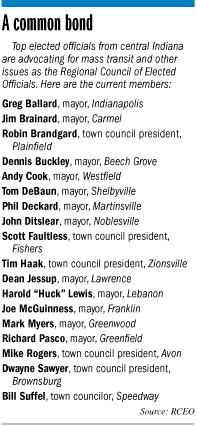Subscriber Benefit
As a subscriber you can listen to articles at work, in the car, or while you work out. Subscribe NowAs Westfield Mayor Andy Cook discovered when he took office four years ago, local government officials face no shortage of topics for commiseration.
Whether it’s the state-mandated budgeting process or the state-imposed deadline for consolidating 911 services, they’ll usually agree, “We’ve got to do something about it,” he said. “That’s where it ends, typically.”
 Westfield Mayor Andy Cook leads a regional group of elected officials.
Westfield Mayor Andy Cook leads a regional group of elected officials.Cook and the leaders of 17 other central Indiana cities and towns have formed a group that intends to do more than commiserate. They’re mounting an offense around issues of regional concern, starting with a proposed $1.3 billion, 10-year mass transit plan. The central Indiana group, which calls itself the Regional Council of Elected Officials, endorsed the transit plan, and members—including those from far-flung, unaffected communities like Shelbyville—agreed to help rally support for a related bill.
The transit bill, written by Rep. Jerry Torr, R-Carmel, would create a nine-county transit district and would allow ballot questions in Marion and Hamilton counties on whether to raise local income taxes to help fund transit. The first, 10-year phase calls for a commuter rail line from Noblesville to downtown Indianapolis and doubling bus service in the metro area.
The transit bill died in the last legislative session, but the Central Indiana Transit Task Force thinks it has a stronger chance this time around as more Republican lawmakers come aboard. Task force Executive Director Ron Gifford said it’s important to show the bill has support beyond Indianapolis and the Hamilton County town that would see the immediate benefits.
“All the planning we’re doing today in building out the backbone of the system will be critical to those communities,” Gifford said. “I think they will be very public and very vocal about this,” he said of the mayors’ group.
The bill’s most likely roadblock is the Senate. One skeptic, Sen. Mike Young, R-Speedway, said he’s not swayed by local officials. In fact, he thinks the referendum approach is a way for them to duck voting for a tax increase.
“When we pass a tax, we don’t put it on the ballot and let voters decide. We either do it or don’t do it,” he said. “They’re the elected official, and they’ve got to be on record for voting for or voting against it.”
 Shelbyville is not part of the regional transit plan, not in the first phase or any subsequent expansions. Yet Mayor Tom DeBaun agreed to advocate for it because he thinks it will make the whole region more attractive to employers. He can also see the political benefits of pitching in on an issue that’s dear to Indianapolis Mayor Greg Ballard and other elected leaders.
Shelbyville is not part of the regional transit plan, not in the first phase or any subsequent expansions. Yet Mayor Tom DeBaun agreed to advocate for it because he thinks it will make the whole region more attractive to employers. He can also see the political benefits of pitching in on an issue that’s dear to Indianapolis Mayor Greg Ballard and other elected leaders.
“At some point, I’m going to need Mayor Ballard or someone else to help me work on something that’s specific to Shelbyville,” DeBaun said. “In my mind, that’s the point of the group.”
Local government leaders often band together on regional topics, such as methamphetamine abuse in southwestern Indiana, but the Regional Council’s effort is the most visible right now, said Matt Greller, executive director of the Indiana Association of Cities and Towns.
If any regional coalition is going to exert influence at the Statehouse, it should be central Indiana. Regional Council communities represent 26 percent of the state’s population, contribute 33 percent of tax revenue, and receive 27 percent of that revenue in return, Cook noted. (The group includes any community in Marion and its seven surrounding counties with at least 10,000 in population.)
Cook, Ballard and other central Indiana mayors began meeting informally four years ago, and it took a while to settle upon a priority issue, Cook said. Lately though, the group is gaining steam. The Regional Council receives financial and professional support from the Urban Land Institute Indiana, and it’s moving forward on another complex issue—the regional water supply.
Last summer’s drought pushed that topic to No. 2 on the priority list, and it’s not likely to drop off, Cook said.
“Water is going to be the oil, if you will, in 20 years,” Cook said. Currently, he said, “Whatever company or municipality can stick the most straws in the ground wins.”
Cooperation could mean forming a regional governance structure. As with mass transit, that would require state legislation, Cook said.
The Regional Council’s agenda is really of statewide importance, Greller said.
Greller, who works closely with the Regional Council, said IACT and the council are involved in some of the same issues. He said IACT supports Indiana’s mass transit bill because it would be a litmus test for similar initiatives from other metro areas. Questions about water supply could hinder growth in communities all along the Interstate 69 corridor, Greller said, and IACT is formulating a policy on that topic, too.
IACT also tracks hundreds of bills each session, and it does a good job playing defense, Cook said.
Plainfield Town Council President Robin Brandgard hopes his peers from the region can put an end to his frustration over funding 911 dispatching.
Hendricks County already consolidated its service, he said, but not every community is paying its fair share because lawmakers won’t sign off on a new funding plan.
Brandgard said he’s spent four years on the issue and testified twice at the Statehouse.
“It is a struggle for local government to work with the Legislature,” he said.•
Please enable JavaScript to view this content.
